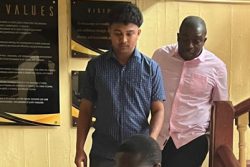Whether it is Chinese Landing, Jawalla, Paruima, Waramadong, Kako, Imbaimadai, Isseneru, Kangaruma or Tassarene, to name a few, mining permissions are being given by the Guyana Geology and Mines Commission (GGMC) without following the due process of informing the Indigenous communities first. Whether it is a lack of respect, lack of acknowledgement, or the intention to steamroll, considering the regularity with which this occurs, plausible deniability through conveniently coinciding coincidences is an impossible excuse to swallow.
The uphill battle for land rights has been ever-lasting, with an increasing number of indigenous communities standing up and putting their feet down in the face of adversity and bullying. Communities such as Kako and Isseneru, which put up a considerable and commendable fight to keep miners out of their lands, and Omanaik/Kambaru, which has been refusing to have demarcation of their lands because of numerous existing mining claims, are only a few of them. Why must it be that so many Indigenous peoples must fight, live anxiously, and struggle for recognition of their lands?
Free, prior, and informed consent seems to be a concept lost on the Government and its agencies. For those who choose to present themselves as not understanding this concept, the simple task of seeking permission before selling people’s lands is one of the first steps. Being granted permission is the second step.
As Toshao of Kako Romario Hastings said at Jawalla Village Council’s press conference on the 29th of March, “it’s about respecting indigenous rights to giving their consents, had GGMC notified or asked you or engaged you before granting these mining blocks, I am certain the answer would be no because now aunty or uncle wake up one morning and see these people coming in and are served notices of eviction. This should not happen, this is a blatant disregard of Indigenous rights, and in saying so, it would have been good if GGMC engaged us from the inception.”
In an interview with Latin America Bureau contributor Maozya Murray, Túpac Amaru activist Indigenous leader Marisol Garcia Apagueño said “We do not depend on a supermarket, a pharmacy or a car that runs on fossil fuels – we depend on our territory. When we are dispossessed, our survival is threatened. We cannot pass on our ancestral knowledge and use of these spaces to future generations.”
When a mining licence/block is purchased by an interested miner without the permission granted by the Indigenous communities, this results in the following realities of many Indigenous peoples. Imagine living in your home and one day randomly receiving a letter saying you have 3 days to evacuate, as is the case with Moore James in Jawalla, because GGMC sold all of your land without informing you.
Imagine living in your home, depending on your farm for survival, only to realise that somebody from Georgetown suddenly has their machines digging up your farms because they have a paper from GGMC saying they can.
Imagine living in your home, depending on the streams around you for flowing water used to quench your thirst, to wash yourself and your family, only to after a few months, have to walk an extra 45 minutes (one way) to get to the nearest stream which will soon also be affected because GGMC has sold other mining blocks in that area as well.
Imagine working on your farm for decades, only to be told one day that some people from Georgetown sold your land from right under you, and the people they sold it to are preventing you from gaining access to your land.
Imagine depending on the animals existing around your farm for your hunting, and suddenly there are no animals within miles because of the excavators, which are suddenly vibrating the area, scarring the land with no intentions of any reparatory efforts.
Imagine existing miles away from the nearest signal point, no GWI to fix the water situation, no GPL to send their people to reconnect your power, just the reality that after raising your issues at the most recent National Toshaos Council, the Minister in charge of addressing your issues said she was not aware of any of your issues. After you made her aware, it was as if you hadn’t.
Imagine seeing mining being stopped in Aranaputa, and hoping it would also happen in your area because of the damage occurring in your area, but getting radio silence when you cry for help.
This issue does not just fall at the feet of GGMC in its refusal to engage with the indigenous communities before granting mining licences, it also falls on the Government of Guyana for not recognizing this trend and addressing it. This sloppy job of disregarding Indigenous people’s rights is inexcusable and raises many questions about the validity of the belief that Guyana is very advanced in the sphere of championing Indigenous People’s rights.









